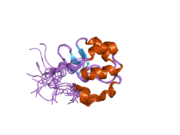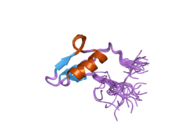- CHD7
-
Chromodomain-helicase-DNA-binding protein 7 also known as ATP-dependent helicase CHD7 is an enzyme that in humans is encoded by the CHD7 gene.[1][2]
CHD7 is an ATP-dependent chromatin remodeler homologous to the Drosophila trithorax-group protein Kismet.[3] Mutations in CHD7 are associated with CHARGE syndrome.[4]
References
- ^ Nagase T, Kikuno R, Ishikawa KI, Hirosawa M, Ohara O (February 2000). "Prediction of the coding sequences of unidentified human genes. XVI. The complete sequences of 150 new cDNA clones from brain which code for large proteins in vitro". DNA Res. 7 (1): 65–73. doi:10.1093/dnares/7.1.65. PMID 10718198.
- ^ "Entrez Gene: chromodomain helicase DNA binding protein 7". http://www.ncbi.nlm.nih.gov/sites/entrez?Db=gene&Cmd=ShowDetailView&TermToSearch=55636.
- ^ Bajpai R, Chen DA, Rada-Iglesias A, Zhang J, Xiong Y, Helms J, Chang CP, Zhao Y, Swigut T, Wysocka J (February 2010). "CHD7 cooperates with PBAF to control multipotent neural crest formation". Nature 463 (7283): 958–62. doi:10.1038/nature08733. PMC 2890258. PMID 20130577. http://www.pubmedcentral.nih.gov/articlerender.fcgi?tool=pmcentrez&artid=2890258.
- ^ Vissers LE, van Ravenswaaij CM, Admiraal R, Hurst JA, de Vries BB, Janssen IM, van der Vliet WA, Huys EH, de Jong PJ, Hamel BC, Schoenmakers EF, Brunner HG, Veltman JA, van Kessel AG (September 2004). "Mutations in a new member of the chromodomain gene family cause CHARGE syndrome". Nat. Genet. 36 (9): 955–7. doi:10.1038/ng1407. PMID 15300250.
Further reading
- Delahaye A, Sznajer Y, Lyonnet S, et al. (2007). "Familial CHARGE syndrome because of CHD7 mutation: clinical intra- and interfamilial variability.". Clin. Genet. 72 (2): 112–21. doi:10.1111/j.1399-0004.2007.00821.x. PMID 17661815.
- Van de Laar I, Dooijes D, Hoefsloot L, et al. (2007). "Limb anomalies in patients with CHARGE syndrome: an expansion of the phenotype.". Am. J. Med. Genet. A 143A (22): 2712–5. doi:10.1002/ajmg.a.32008. PMID 17937444.
- Holak HM, Kohlhase J, Holak SA, Holak NH (2008). "New recognized ophthalmic morphologic anomalies in CHARGE syndrome caused by the R2319C mutation in the CHD7 gene.". Ophthalmic Genet. 29 (2): 79–84. doi:10.1080/13816810801918391. PMID 18484313.
- Sanlaville D, Verloes A (2007). "CHARGE syndrome: an update.". Eur. J. Hum. Genet. 15 (4): 389–99. doi:10.1038/sj.ejhg.5201778. PMID 17299439.
- Kim HG, Kurth I, Lan F, et al. (2008). "Mutations in CHD7, encoding a chromatin-remodeling protein, cause idiopathic hypogonadotropic hypogonadism and Kallmann syndrome.". Am. J. Hum. Genet. 83 (4): 511–9. doi:10.1016/j.ajhg.2008.09.005. PMC 2561938. PMID 18834967. http://www.pubmedcentral.nih.gov/articlerender.fcgi?tool=pmcentrez&artid=2561938.
- Dagle JM, Lepp NT, Cooper ME, et al. (2009). "Determination of genetic predisposition to patent ductus arteriosus in preterm infants.". Pediatrics 123 (4): 1116–23. doi:10.1542/peds.2008-0313. PMC 2734952. PMID 19336370. http://www.pubmedcentral.nih.gov/articlerender.fcgi?tool=pmcentrez&artid=2734952.
- Wincent J, Schulze A, Schoumans J (2009). "Detection of CHD7 deletions by MLPA in CHARGE syndrome patients with a less typical phenotype.". Eur J Med Genet 52 (4): 271–2. doi:10.1016/j.ejmg.2009.02.005. PMID 19248844.
- Wincent J, Holmberg E, Strömland K, et al. (2008). "CHD7 mutation spectrum in 28 Swedish patients diagnosed with CHARGE syndrome.". Clin. Genet. 74 (1): 31–8. doi:10.1111/j.1399-0004.2008.01014.x. PMID 18445044.
- Gennery AR, Slatter MA, Rice J, et al. (2008). "Mutations in CHD7 in patients with CHARGE syndrome cause T-B + natural killer cell + severe combined immune deficiency and may cause Omenn-like syndrome.". Clin. Exp. Immunol. 153 (1): 75–80. doi:10.1111/j.1365-2249.2008.03681.x. PMC 2432100. PMID 18505430. http://www.pubmedcentral.nih.gov/articlerender.fcgi?tool=pmcentrez&artid=2432100.
- Tellier AL, Cormier-Daire V, Abadie V, et al. (1998). "CHARGE syndrome: report of 47 cases and review.". Am. J. Med. Genet. 76 (5): 402–9. doi:10.1002/(SICI)1096-8628(19980413)76:5<402::AID-AJMG7>3.0.CO;2-O. PMID 9556299.
- Jongmans MC, van Ravenswaaij-Arts CM, Pitteloud N, et al. (2009). "CHD7 mutations in patients initially diagnosed with Kallmann syndrome--the clinical overlap with CHARGE syndrome.". Clin. Genet. 75 (1): 65–71. doi:10.1111/j.1399-0004.2008.01107.x. PMC 2854009. PMID 19021638. http://www.pubmedcentral.nih.gov/articlerender.fcgi?tool=pmcentrez&artid=2854009.
- Jongmans MC, Hoefsloot LH, van der Donk KP, et al. (2008). "Familial CHARGE syndrome and the CHD7 gene: a recurrent missense mutation, intrafamilial recurrence and variability.". Am. J. Med. Genet. A 146A (1): 43–50. doi:10.1002/ajmg.a.31921. PMID 18074359.
- Vuorela PE, Penttinen MT, Hietala MH, et al. (2008). "A familial CHARGE syndrome with a CHD7 nonsense mutation and new clinical features.". Clin. Dysmorphol. 17 (4): 249–53. doi:10.1097/MCD.0b013e328306a704. PMID 18978652.
- Bergman JE, de Wijs I, Jongmans MC, et al. (2008). "Exon copy number alterations of the CHD7 gene are not a major cause of CHARGE and CHARGE-like syndrome.". Eur J Med Genet 51 (5): 417–25. doi:10.1016/j.ejmg.2008.03.003. PMID 18472328.
- Lee YW, Kim SC, Shin YL, et al. (2009). "Clinical and genetic analysis of the CHD7 gene in Korean patients with CHARGE syndrome.". Clin. Genet. 75 (3): 290–3. doi:10.1111/j.1399-0004.2008.01127.x. PMID 19159393.
- Qi Q, Yi L, Yang C, et al. (2008). "[Mutation analysis of the CHD7 gene in patients with congenital heart disease]". Zhonghua Yi Xue Yi Chuan Xue Za Zhi 25 (6): 637–41. PMID 19065520.
- Writzl K, Cale CM, Pierce CM, et al. (2007). "Immunological abnormalities in CHARGE syndrome.". Eur J Med Genet 50 (5): 338–45. doi:10.1016/j.ejmg.2007.05.002. PMID 17684005.
- Nakajima D, Okazaki N, Yamakawa H, et al. (2002). "Construction of expression-ready cDNA clones for KIAA genes: manual curation of 330 KIAA cDNA clones.". DNA Res. 9 (3): 99–106. doi:10.1093/dnares/9.3.99. PMID 12168954.
- Vuorela P, Ala-Mello S, Saloranta C, et al. (2007). "Molecular analysis of the CHD7 gene in CHARGE syndrome: identification of 22 novel mutations and evidence for a low contribution of large CHD7 deletions.". Genet. Med. 9 (10): 690–4. doi:10.1097/GIM.0b013e318156e68e. PMID 18073582.
- Layman WS, McEwen DP, Beyer LA, et al. (2009). "Defects in neural stem cell proliferation and olfaction in Chd7 deficient mice indicate a mechanism for hyposmia in human CHARGE syndrome.". Hum. Mol. Genet. 18 (11): 1909–23. doi:10.1093/hmg/ddp112. PMC 2678924. PMID 19279158. http://www.pubmedcentral.nih.gov/articlerender.fcgi?tool=pmcentrez&artid=2678924.
External links
- GeneReviews/NCBI/NIH/UW entry on Kallmann syndrome
- GeneReviews/NCBI/NIH/UW entry on CHARGE syndrome
- GeneReviews/NCBI/NIH/UW entry on Anophthalmia / Microphthalmia Overview
- MeSH CHD7+protein,+human
PDB gallery Hydrolases: acid anhydride hydrolases (EC 3.6) 3.6.1 3.6.2 3.6.3-4: ATPase 3.6.3Cu++ (3.6.3.4)Ca+ (3.6.3.8)Na+/K+ (3.6.3.9)H+/K+ (3.6.3.10)ATP4AOther P-type ATPase3.6.43.6.5: GTPase 3.6.5.1: Heterotrimeric G protein3.6.5.2: Small GTPase > Ras superfamily3.6.5.3: Protein-synthesizing GTPase3.6.5.5-6: Polymerization motorsTranscriptional regulation prokaryoticeukaryoticbothPromotion Promoter (Pribnow box, TATA box, BRE, CAAT box, Response element) · Enhancer (E-box, Response element) · Insulator · SilencerInitiation (prokaryotic,
eukaryotic)Transcription start siteElongation Termination
(prokaryotic,
eukaryotic)Categories:- Human proteins
- Chromosome 8 gene stubs
Wikimedia Foundation. 2010.




